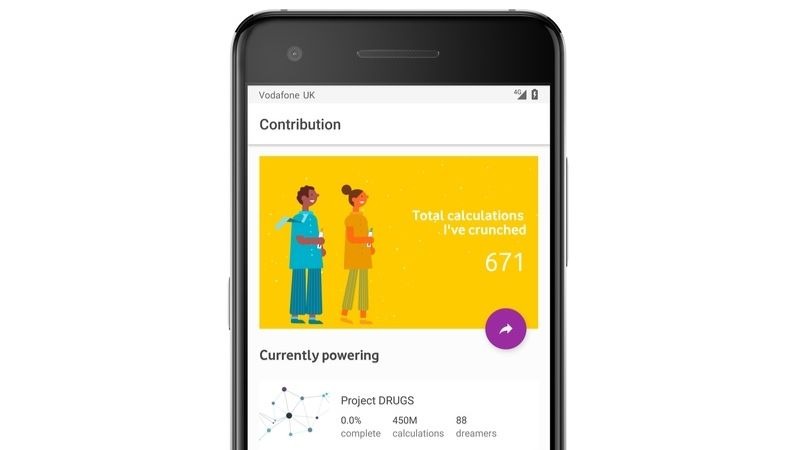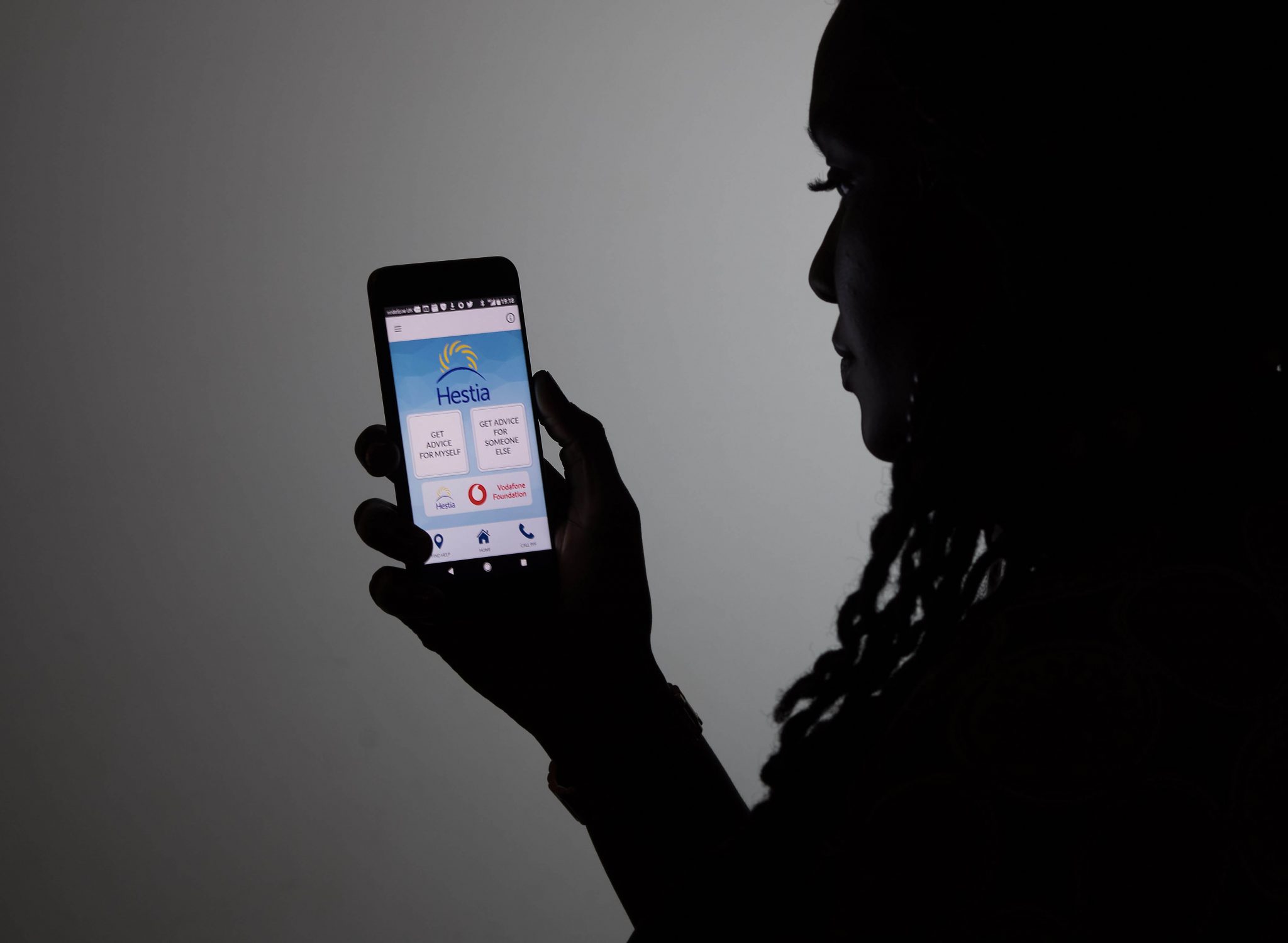
Every two minutes, someone in the UK is diagnosed with cancer. As people live longer lives, the risk of developing cancer has risen to 1 in 2. That’s why we’re asking smartphone users across the UK to join us in the fight against cancer by downloading the Dream Lab app, which can help to speed up vital cancer research. Here’s how it works.
https://www.youtube-nocookie.com/watch?v=x5GL3GL1Fr0&feature=youtu.be
By Helen Lamprell, General Counsel & External Affairs Director, Vodafone UK and Trustee of the Vodafone Foundation
As a trustee of the Vodafone Foundation, a UK registered charity[i], I’m a firm believer in the power of technology to tackle critical issues we face as a society in areas like health. It’s striking that every two minutes, someone in the UK is diagnosed with cancer. As people live longer lives, the risk of developing cancer has risen to 1 in 2. That’s why we’re asking smartphone users across the UK to join us in the fight against cancer by downloading the DreamLab app, which can help to speed up vital cancer research. Here’s how it works.
DreamLab is available for Android and iOS users on any network. All you need to do is leave your phone plugged in at night when you’re sleeping.[ii] Through a partnership between the Vodafone Foundation and researchers at Imperial College London, the processing power of your smartphone will be used to assist in a project that ultimately aims to help speed up access to effective cancer drugs.
DreamLab uses your smartphone to fast-track cancer research

While your phone is idle and charging, DreamLab will use its computing power to crunch cancer research data. By harnessing the collective processing power of as many smartphones as possible, DreamLab creates a virtual supercomputer to speed up these research calculations.
Join more than 100,000 people already using DreamLab
An award-winning app, DreamLab was developed by the Vodafone Foundation in Australia in partnership with the Garvan Institute of Medical Research, a cancer research charity. Garvan’s pioneering work aimed to understand cancer based on a patient’s DNA profile, rather than on the tissue in which the cancer started. Thanks to more than 122,000 DreamLab users in Australia – whose smartphones performed a total of 75 million calculations – Garvan researchers were able to finish their project in half the time it would have taken using the computing resources at their Institute.
How DreamLab will help cancer researchers at Imperial College London

DreamLab will be used in a cancer research project led by Dr Kirill Veselkov, Lecturer in the Department of Surgery and Cancer at Imperial College’s Faculty of Medicine. This project, called DRUGS (Drug Repositioning Using Grids of Smartphones), aims to find new uses or more effective combinations for existing drugs that are tailored to the genomic makeup of cancer.
Finding new uses for existing drugs – known as drugs ‘repositioning’ – speeds up the discovery of new treatments. Since existing drugs have already passed key safety tests while in the early stages of development, they could potentially secure regulatory approval in less time compared with a brand new drug, and at less cost.
Dr Veselkov and his team have designed an algorithm that takes a huge dataset and breaks that data down into manageable chunks, so that millions of calculations can be performed using the DreamLab app. These calculations will evaluate the likely effects of existing drugs on different types of cancer, based on the genetic profiles of cancer patients. In the long run, the researchers believe that their work could find new combinations of cancer drugs, accelerate access to effective drugs and enable tailored treatments for patients.
Speeding up cancer research with DreamLab
Using DreamLab, Imperial researchers will be able to complete their calculations faster than if they relied on a desktop computer with an eight-core processor. Even if that desktop computer were to operate 24-hours a day, it would still take 300 years to process the data. A network of 100,000 smartphones running six hours a night, on the other hand, could get the work done in just three months.
Today’s new smartphones can run up to 60 calculations, solving up to 24,000 problems in six hours if fully charged and plugged in – which will use about 500MB of data over the course of a month.
For Vodafone customers, using DreamLab won’t eat into your monthly data allowance.[iii] Users on other networks can connect to Wi-Fi to avoid using up their data.
I hope you’ll join me and other DreamLab users across the UK in helping to fight cancer. You can download DreamLab for iOS from the App store, or for Android from Google Play. Please help us to spread the word using the hashtag #SleepLikeAHero, and follow us on @VodafoneUKNews for news and updates on DreamLab.
Notes to editors
[i] The Vodafone Foundation supports projects that are focused on delivering public benefit through the application of technology across the areas of health, education and disaster relief. A UK registered charity (1089625), it invests in the communities in which Vodafone operates and is at the centre of a network of global and local social investment programmes.
[ii] DreamLab does not access any of your private information. You can read the DreamLab privacy policy in the app settings. More FAQs are available here.
[iii] For Vodafone UK customers, the mobile data to use DreamLab is free in the UK or in our Roam free/Europe Zone destinations. Standard UK rates apply if you exceed your allowance while roaming. For roaming outside the UK and the Roam-free/Europe Zone destinations you’ll be charged our standard data roaming charges for the country you’re visiting. Vodafone Pay as you go customers must have credit on their account for DreamLab to work over our network (though it’ll still work over Wi-Fi). Terms, exclusions & destinations at vodafone.co.uk/roaming
If you’re also contributing to DreamLab over Wi-Fi, you may be charged depending on your home broadband package and usage. If you have Vodafone Home Broadband your data is unlimited, so you don’t need to worry.
Vodafone UK Enterprise customers using a non-Vodafone APN setting (for example, using their organisation’s APN setting or VPN) will be charged according to their mobile price plan. More FAQs are available here.




